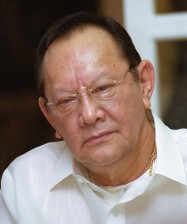
Eduardo “Danding” Cojuangco Jr., President Aquino’s uncle, holds at least P85 billion worth of SMC shares that the farmers claimed were bought with coco levy funds. INQUIRER FILE PHOTO
LUCENA CITY—The government’s receipt of P56.5 billion from San Miguel Corp. representing proceeds from the sale of its 24-percent stake in the country’s biggest food conglomerate bought with coconut levy funds is only a partial victory for the country’s coconut farmers as the amount is only part of the list of civil cases on the disposal of the fund, a lawyer for coconut farmers’ groups said Monday.
“The coco levy saga is far from over,” Marco Sardillo III, former executive director of the Presidential Commission on Good Government (PCGG), said in an e-mail interview.
Sardillo said the recovered fund was just one part of Civil Case No. 33-F, which in itself was just one-eighth of Civil Cases Nos. 33-A to H, all pertaining to the disposal of the multibillion-peso coconut levy fund.
“Justice will not be complete until the 20-percent SMC shares are restored to the hands of their rightful owners—and that chapter in our history won’t be set right until all these coco levy cases are resolved,” Sardillo said.
In April 2011, the Supreme Court voted 7-4-4 to award 20-percent of the SMC shares to known Marcos crony and current SMC chairman Eduardo “Danding” Cojuangco Jr.
Cojuangco, President Aquino’s uncle, holds at least P85 billion worth of SMC shares that the farmers claimed were bought with coco levy funds.
But Cojuangco last year sold his stake in SMC to its president and his trusted executive, Ramon Ang, and to Top Frontier, SMC’s biggest shareholder, which is headed by Marcos Trade Minister Roberto Ongpin.
Letter to SC
Last month, some 3,000 coconut farmers from Quezon province, including children, submitted a letter to the Supreme Court urging its committee on ethics and ethical standards to investigate the high court’s “questionable” April 2011 ruling declaring Cojuangco the rightful owner of the disputed SMC shares.
Fr. Edwin Garriguez, executive director of the Catholic Bishops’ Conference of the Philippines-National Secretariat for Social Action (CBCP-Nassa), sent a similar letter to the high court.
Sardillo urged the Aquino administration to keep the P56.5 billion “intact and secured from those who may have designs or interests that deviate from the clear instruction of the January 2012 decision of the Supreme Court: That it may only be used for the benefit of all coconut farmers and for the development of the entire coconut industry.”
He expressed concerns about the reported plan of the Aquino administration to use part of the fund to finance the government’s antipoverty program as this was ill-timed what with the 2013 elections just around the corner.
Sardillo urged the different farmer groups to be united in their demand to keep the fund intact as a perpetual trust fund for the coconut industry.
He said that dividing and distributing the money would only represent a few thousand pesos in the hands of this generation of coconut farmers. “When the money is gone, what happens then?” he said.
Economic, political power
He said the fund is the “economic and political power” the farmers could wield to ensure that their issues are heard and addressed by all politicians long after 2016.
Quezon farmers are claiming to be the biggest contributors to the coconut levy fund, a tax exacted from coconut farmers from 1973 to 1982 during Ferdinand Marcos’ martial law regime, supposedly to develop the coconut industry.
The levy fund instead was used by Cojuangco to acquire shares of stock in SMC while he was president of United Coconut Planters Bank.
After Marcos’ ouster in 1986, the SMC shares were sequestered by the government. Then valued at P2 billion, the fund is now estimated to be worth over P200 billion.